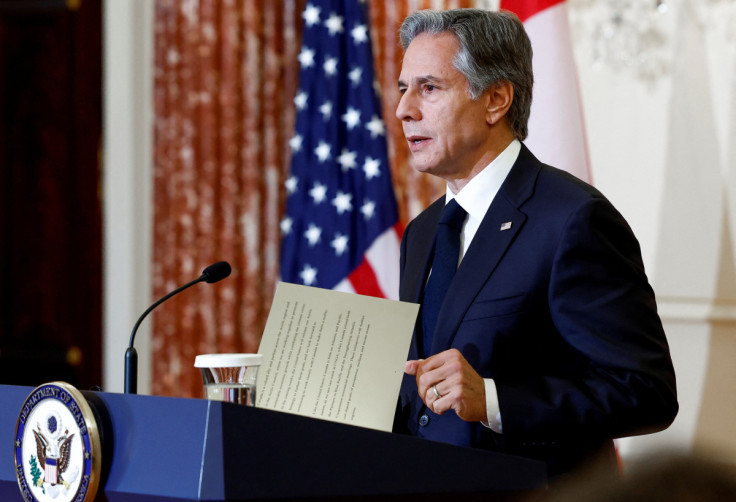US Reiterates Support To Taiwan As China's Annexation Plans Move On 'Much Faster Timeline'
KEY POINTS
- Blinken says Beijing changed its approach toward the peace and stability successfully maintained for decades
- Conflict between China and Taiwan would have an enormous impact on the world economy
- China has said it would seek peaceful reunification with Taiwan, but did not rule out use of force.
Reiterating the U.S. determination to support Taipei in defending itself against Beijing's aggression, Secretary of State Antony Blinken on Monday said China under President Xi Jinping is pursuing an agenda to annex Taiwan on a "much faster timeline," and warned of global economic disruption if it were to happen.
"Instead of sticking with the status quo that was established in a positive way," Secretary Blinken said, China has made a "fundamental decision that the status quo is no longer acceptable, and Beijing is determined to pursue reunification on a much faster timeline."
Blinken made these observations during a conversation on the Evolution and Importance of Technology, Diplomacy, and National Security with former Secretary of State Condoleezza Rice at Stanford University, a press release issued by the State Department said.
The Secretary of State emphasized that the peaceful resolution of differences between Beijing and Taipei lay at the heart of the U.S. commitment to the "one China" policy.
Beijing had changed its approach toward the peace and stability that has been successfully maintained for decades in the region, Secretary Blinken said, pointing out that "there has been a change in the approach from Beijing toward Taiwan in recent years."
"And if peaceful means didn't work, then it would employ coercive means – and possibly, if coercive means don't work, maybe forceful means – to achieve its objectives. And that is what is profoundly disrupting the status quo and creating tremendous tensions," Blinken said.
The need for a peaceful resolution of differences between Beijing and Taipei was a matter of concern not just for the U.S. but for countries around the world, given the volume of commercial traffic that goes through the Taiwan strait.
The 180 km (110 miles) wide Taiwan Strait separates Taiwan from mainland China. Beijing considers the self-ruled island democracy as a renegade territory and has repeatedly said that it will seek to reunify Taiwan by force if required.
Recently, following the solidarity visit by House Speaker Nancy Pelosi to Taipei, Beijing deployed scores of planes and fired live missiles near Taiwan in its biggest drills in the Taiwan Strait. Apart from the Taiwan Strait, China also seeks to lay claim over most of the resource-rich global trade routes in the South China Sea region.
In his conversation with former Secretary Rice, Blinken said that considering the volume of commercial traffic that goes through the Taiwan straits each day and the conflict between China and Taiwan would have an enormous impact on the world economy. Similarly, if Taiwanese production of semiconductors was disrupted, it would result in an economic crisis around the world.
"So there's a profound stake not just for us but for countries around the world in preserving peace and stability when it comes to Taiwan and the straits, and to making sure that the differences that exist are resolved peacefully. So that's why we've been so engaged on this," Blinken said.
"I hope that Beijing will come back to a place where it actually sees the merits in making sure that differences are peacefully resolved, that it doesn't try to force things through coercion, and even worse, through force."
Adding that the U.S. is determined to make good on its commitments to Taiwan under the Taiwan Relations Act, Blinken said, "Beijing will come back to a place where it actually sees the merits in making sure that differences are peacefully resolved, that it doesn't try to force things through coercion, and even worse, through force."
Blinken's comments follow the recent address by Jinping, who told delegates at the 20th party congress in Beijing on Sunday that China would do its utmost to achieve peaceful reunification with Taiwan, but would not rule out the use of force to bring the island under its control.
The Chinese President has also reaffirmed the military role as a strategic tool for achieving the ideological goal of national rejuvenation saying that the use of military power needs to be normalized to win regional wars.

© Copyright IBTimes 2024. All rights reserved.






















